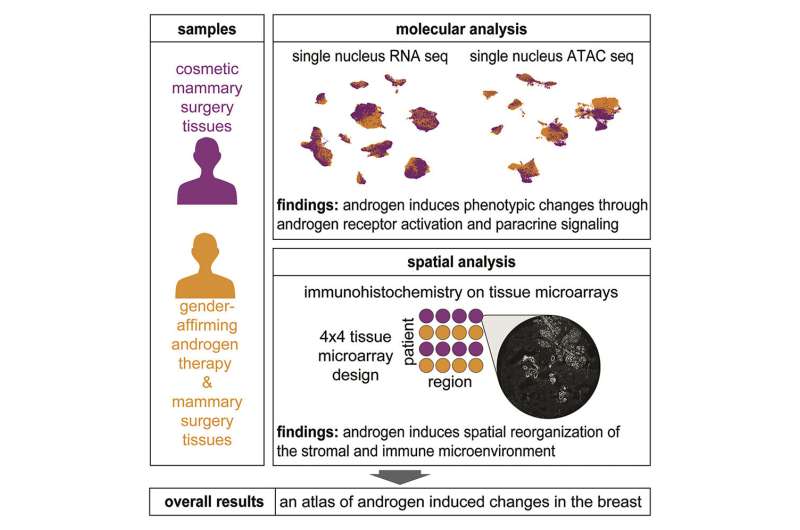This article has been reviewed according to Science X's editorial process and policies. Editors have highlighted the following attributes while ensuring the content's credibility:
fact-checked
peer-reviewed publication
trusted source
proofread
Gender-affirming androgen therapy 'reprograms' breast tissue in transgender men to more closely resemble cis-male tissue

For the first time, researchers examine the effects of gender-affirming androgen therapy on breast tissue in transgender men with single-cell resolution. Their results give an unprecedented look into the changes that occur as a result of gender-affirming androgen therapy—a common and highly effective form of transgender care—but also have implications for the treatment of breast cancer across all populations. Notably, they show that gene expression in breast cells is silenced, and male gene programs are activated. This work appears in the journal Cell Genomics on March 8.
"Many of the gene-expression changes induced by androgen therapy were also consistent with male-specific sex biases uncovered when comparing breast tissues and other organs from cis-gender males and females," write the authors. This includes the increased expression of the gene CUX2, which has the highest expression in the prostate as well as elevated levels in cis-male liver and breast tissues compared to cis-female tissues.
The researchers obtained breast tissue from mastectomies of transgender men who had undergone androgen therapy and compared them to breast tissue from cis-gender women obtained from cosmetic mammary surgery. For each tissue type, they characterized the associated changes in gene expression and cell-cell interactions while taking into account the spatial profile of the cells.
In the trans-male tissues, they found that cells expressing hormone receptors had been reprogrammed by androgens, and these cells then passed on the effects to nearby cells through paracrine signaling relays. The trans-male cells were silenced compared to cis-female cells, showing fewer unique molecular identifiers and genes. While cis-female cells showed gene expression associated with growth factors and mammary gland development, trans-male cells showed that associated with fatty acid metabolism and calcium signaling.
Within the cis-female samples, the researchers looked at those from both pre- and post-menopausal women. In comparison to the trans-male tissue, the differences between these two tissue types were miniscule, indicating that changes in the trans-male breast most likely occur not simply due to cessation of estrogen production by the ovaries but also directly due to androgens.
A close look at the effect of androgens on breast tissue is also useful for understanding the treatment of breast cancer. It is already known that breast cancer rates are lower in transgender men, and recent studies have shown that activation of androgen receptors can have antitumor activity in certain breast cancers.
In this study, the researchers found that androgen therapy suppressed the expression of genes involved in BRCA-mutant breast cancer. "Overall, this indicates androgen receptor activation may be a valid preventive or therapeutic strategy for ER+ breast cancer, and, in accordance, clinical trials testing androgen receptor activation in this subtype have been implemented," write the authors.
More information: Simon R.V. Knott, The molecular consequences of androgen activity in the human breast, Cell Genomics (2023). DOI: 10.1016/j.xgen.2023.100272. www.cell.com/cell-genomics/ful … 2666-979X(23)00032-0




















